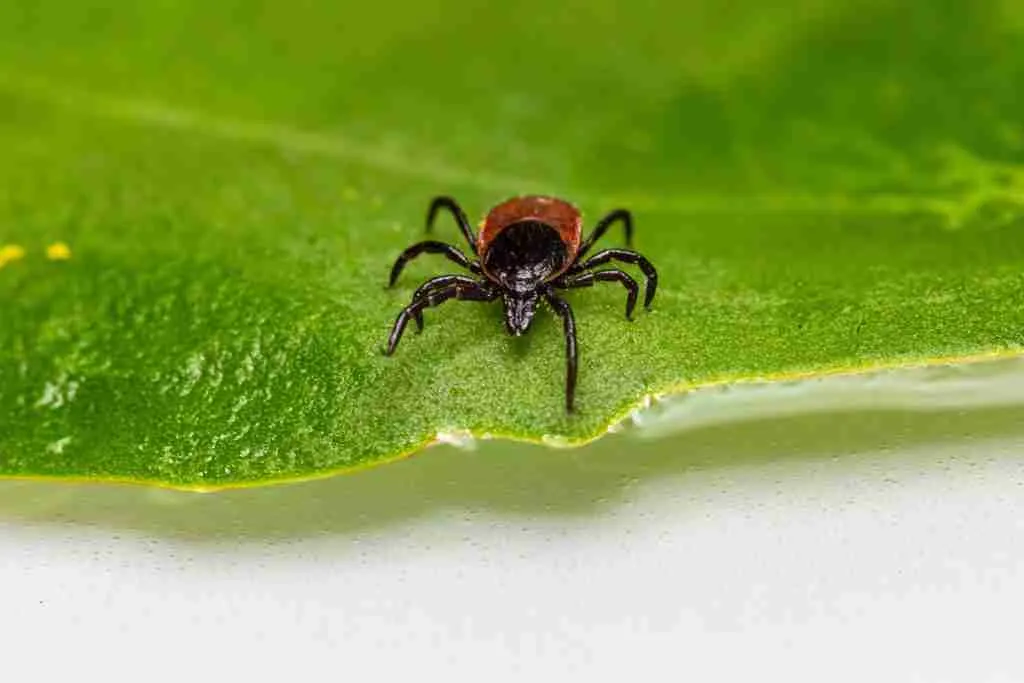Are you constantly battling ticks in your garden? Ticks, aside from being annoying, can carry diseases that are harmful to both humans and pets. In this article, we will guide you through the best plants that repel ticks naturally so you don’t have to rely on harsh chemicals.
Stick around if you need a green solution for these pesky pests!
Contents
ToggleKey Takeaways
- Some of the best plants that naturally repel ticks include rosemary, wormwood, garlic, lavender, mint, lemongrass, geranium, marigold, chamomile, and catnip.
- These plants repel ticks through their strong scents or by producing essential oils that ticks dislike.
- Using plant-based solutions to repel ticks offers benefits such as effectiveness in keeping ticks away, safety compared to chemical repellents, and environmental friendliness.
- Incorporating tick-repelling plants into your yard and garden can be done by planting them directly or using their essential oils as natural tick repellents.
How Plants Naturally Deter Ticks, Fleas, and Mosquitoes

Plants repel ticks in many ways. Some plants have a strong scent that ticks do not like. This smell keeps ticks away from your yard and garden. Lavender, rosemary, and marigolds are good at this job.
Other plants make a thing called an essential oil that can repel ticks. For example, lavender, native to the Mediterranean, produces an oil that helps keep these pests out of your yard.
Also, there are more than 200 types of plants around the world that can chase off ticks! That’s a lot of help for you to stop these pests from biting you or your pets.
Top 10 Repelling Plants: From Lavender and Mint to Rosemary and Lemongrass

Rosemary, wormwood, garlic, lavender, mint, lemongrass, geranium, marigold, chamomile, and catnip are the top 10 plants that naturally repel ticks.
Rosemary
Rosemary is a handy herb to have in your garden. Not just for adding flavor to your meals, but also for keeping ticks at bay. The secret lies in its natural oils. These oils help drive back mites and fleas.
You can use rosemary as a natural tick deterrent. This plant belongs to the 10 plants which repel ticks list. One way to keep mites away is by planting them around the edge of your yard or garden area.
This vibrant plant does more than just deter pests though! Rosemary lends itself well to eco-friendly pest control methods too because of its potent essential oil.
Wormwood
Wormwood is a top pick to keep ticks out of your yard. It grows tall with silvery-green shoots and green leaves. This plant comes from Europe and parts of Asia but it adds beauty to any U.S. garden.
One great thing about wormwood is that it can also deter fleas! That’s why many people love this natural tick repellent. Having wormwood in your yard or garden keeps ticks away and gives you peace of mind.
Garlic
Garlic boasts properties that deter ticks effectively. It has been found that the extract of garlic can actually deter ticks from approaching. This makes it a great option for keeping these pests away from your yard and garden.
Not only does garlic repel ticks, but it also has other benefits such as its anti-fungal, anti-parasitic, and natural antibiotic properties. These properties make garlic an effective choice for preventing tick bites not just on humans, but also on pets.
The strong scent of garlic works as a natural repellent for ticks, making it an excellent addition to your arsenal against these pesky parasites.
Lavender
Lavender stands out as a prime choice for our purpose. Ticks really don’t like the smell of it, so it works well as a deterrent. You can also use lavender essential oil as a tick repellent.
The great thing about this flower is that it grows in many different areas, so you can easily plant it in your garden to keep ticks away.
Mint
Mint offers another herbal solution in our lineup. It contains essential oils that ticks don’t like, especially peppermint oil. Scientific research has shown that mint oils are effective at keeping ticks away.
Mint also works as a natural bug repellent for other pests in your garden, like spider mites and Japanese beetles. The best part is that mint is safe for dogs, so you can use it as a tick repellent in areas where dogs often go.
Lemongrass
Lemongrass is a plant that naturally repels ticks. It has a nice lemon scent and is often used together with lavender as a tick repellent. Lemongrass essential oil can be an alternative to DEET, which is commonly used for tick protection. Want to know more about lemongrass? Check out this article on whether lemongrass is a perennial.
Besides deterring ticks, lemongrass oil also works against mosquitoes and flies in your yard or garden. So, by planting lemongrass, you can keep those pesky insects away naturally!
Geranium
Geranium releases a lemony aroma and citronella oil, making it unappealing to many pests. The essential oil of geranium contains geraniol and citronellol, which are natural compounds that help keep ticks away.
A study has shown that the essential oils of geranium have repellent activity against tick nymphs. Ticks dislike the scent of rose geranium, so they will avoid anything that smells like it.
You can even make your own homemade tick repellent using geranium essential oil. Geranium is definitely one of the top plants to consider if you want to keep ticks out of your yard or garden naturally.
Marigold
Marigolds have a reputation for keeping harmful insects at bay with their strong scent. These vibrant flowers can also deter mosquitoes, nematodes, roaches, and fleas.
The best part is they’re non-toxic and safe to use as a natural flea and tick repellent. These attractive flowering plants can be grown in different conditions, making them a great addition to your garden or yard.
So if you want an effective and safe way to keep ticks at bay, consider planting these beautiful flowers.
Chamomile
Chamomile ranks among the top 10 plants for our purpose. This plant has special properties that make it effective in keeping ticks away. The extract from chamomile flowers can actually stop the survival and egg laying of cattle fever ticks.
Ticks don’t like the earthy scent of chamomile, so they stay away. Growing chamomile is easy because it can adapt to different conditions. People often cultivate chamomile for its nice smell and oils that fight against ticks.
Using chamomile as a tick repellent is a natural and safe alternative to chemical sprays or lotions.
Catnip
Catnip’s properties have been discovered to also naturally ward off ticks. It is also effective in getting rid of mosquitoes and fleas. Catnip oil, in particular, has been shown to be as effective as DEET, a common insect repellent.
This makes catnip a great option for keeping not only ticks but also other pesky insects away from you and your pets. Additionally, catnip has been used for its antibacterial properties and can act as an insect-repellent agent.
So incorporating catnip into your yard or garden can help create a tick-free environment while being safe for both humans and animals.
Using Plant-Based Solutions to Keep Ticks and Other Pests Away

Discover natural tick deterrents and learn about plants that help in repelling ticks from your yard and garden. Curious about how plants grow and contribute to the ecosystem? Here’s a guide on how plants grow.
Natural tick deterrents
Certain plants and essential oils can act as natural deterrents. Lemongrass, cedar, peppermint, geraniol, and thyme are some examples of ingredients that can help drive off bugs when applied to clothing.
Additionally, essential oils such as eucalyptus and citronella can serve as natural repellents.
It’s important to note that permethrin is the most effective tick deterrent and should be applied to clothing rather than directly on the skin.
Benefits of using plant-based solutions
Using plant-based solutions to repulse bugs offers several benefits. First, these natural remedies are effective in keeping them away. Plant compounds contain natural substances that fight off all insects, providing relief and protection from bug bites.
Second, plant-based solutions are a safer alternative to chemical repellents. Unlike synthetic repellents, plant extracts do not contain harmful chemicals that can pose risks to humans or pets.
Third, using plants as repellents is environmentally friendly. By relying on nature’s own defenses, we can reduce our reliance on synthetic pest control methods that may harm the environment.
How to incorporate tick-repelling plants into your yard and garden
To incorporate these plants into your yard and garden, you can start by planting herbs like rosemary, lavender, and mint.
You can plant them in pots or directly in the ground, making sure they get enough sunlight. Another option is to use essential oils from these plants as a natural repellent. Simply mix a few drops with water or carrier oil and apply it to your skin or clothing before going outside.
Additionally, consider planting marigolds and geraniums, as we have mentioned earlier. By adding these plants to your landscape, you can create a beautiful outdoor space!
Other animals that can help control the tick population.
Mice and deer are two animals that can help control the pest population. By keeping these animals away from your yard and garden, you can reduce the number of bugs in your area. Mice are known to carry ticks, so by preventing them from entering your property, you can minimize the risk of tick bites.
Deer, on the other hand, are hosts for adult ticks and by getting rid of them from your garden, you can discourage ticks from laying their eggs there. Taking steps to keep these animals away is an effective way to naturally control the insect population around your home.
Conclusion
In conclusion, this comprehensive guide has provided you with a list of the best plants that naturally repulse ticks. By incorporating plants such as rosemary, lavender, and mint into your yard and garden, you can effectively keep insects at bay.
Using plant-based solutions is not only safe but also beneficial for both humans and animals. In addition to these plants, maintaining well-trimmed grass can also deter ticks from making a home in your yard.
FAQs
1. What are some plants that repel ticks naturally?
Plants like rue, pennyroyal, and mint plants can help deter ticks from your garden. These are also known as tick-repellent garden plants.
2. Can planting tick-repelling plants reduce my risk of Lyme disease?
Yes, since they carry Lyme disease and Rocky Mountain spotted fever, using plant-based natural insect repellents in the form of certain garden plants can reduce your risk.
3. How do I know which plant to pick for deterring ticks?
You need to learn about the specific virtues of each plant on this list that repulses them; check with your local nursery.
4. Are there any indoor-friendly tick-deterring perennial herb options?
Not all perennial herbs suitable in full sun conditions outdoors may be suited indoors for deterring ticks; hence you should always look at the recommended care tips first.
5. Can these tick-repelling plants be harmful to pets?
Some tick-deterring perennials could turn toxic for cats and dogs; so it’s essential to double-check if they’re safe around pets before planting them in areas where your furry friends roam freely.
6. Do these anti-tick plants only kill or eat the pests off?
Apart from killing or eating ticks directly, many help by virtue of being planted – their unique traits ward off deer and mice where a lot of ticks live.























































